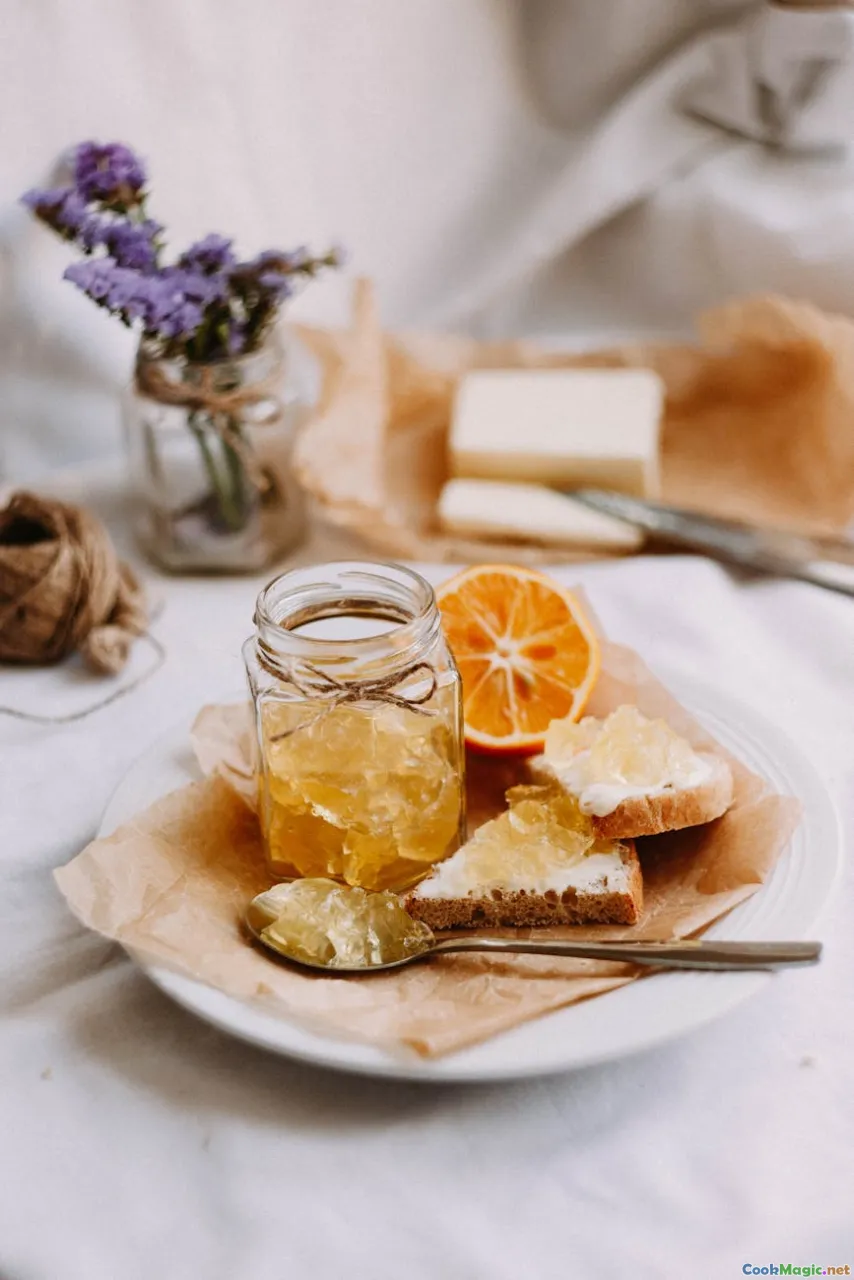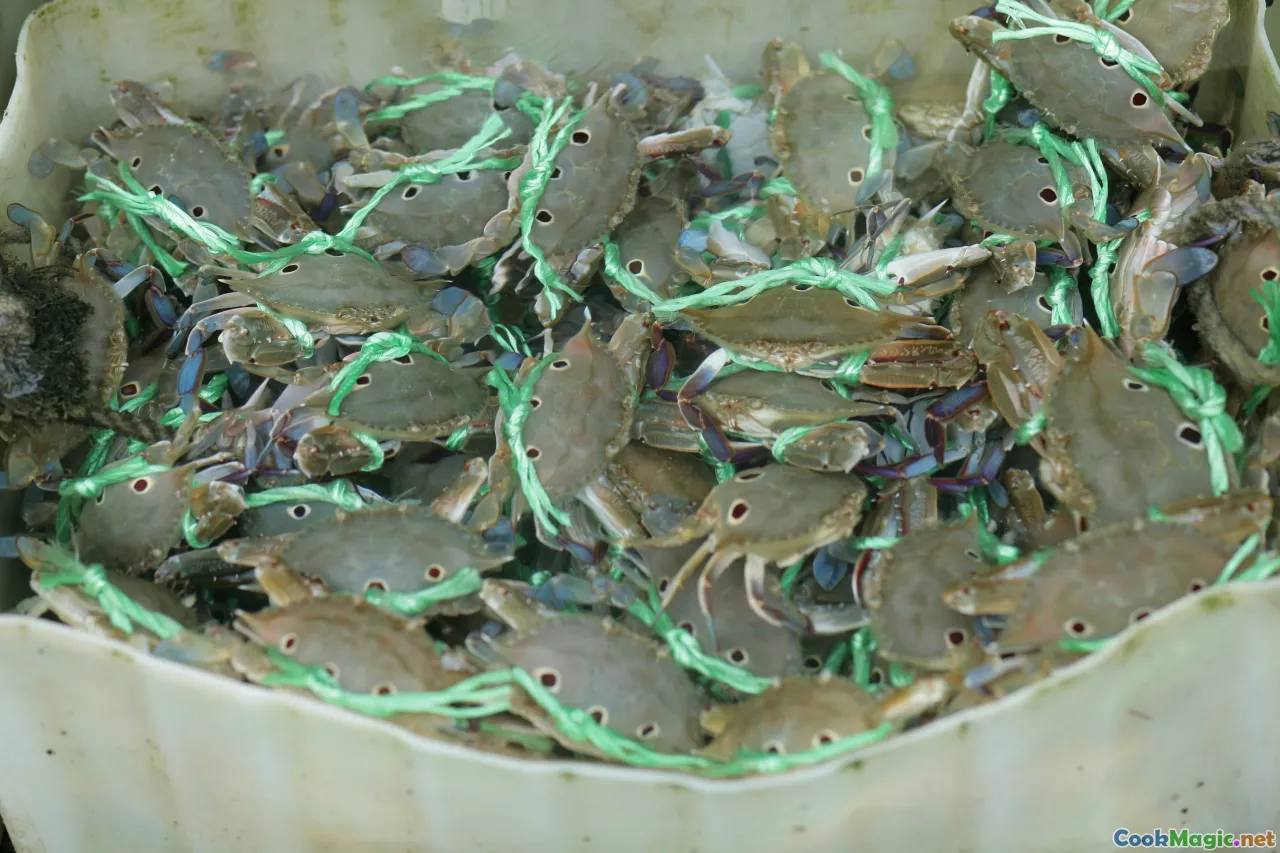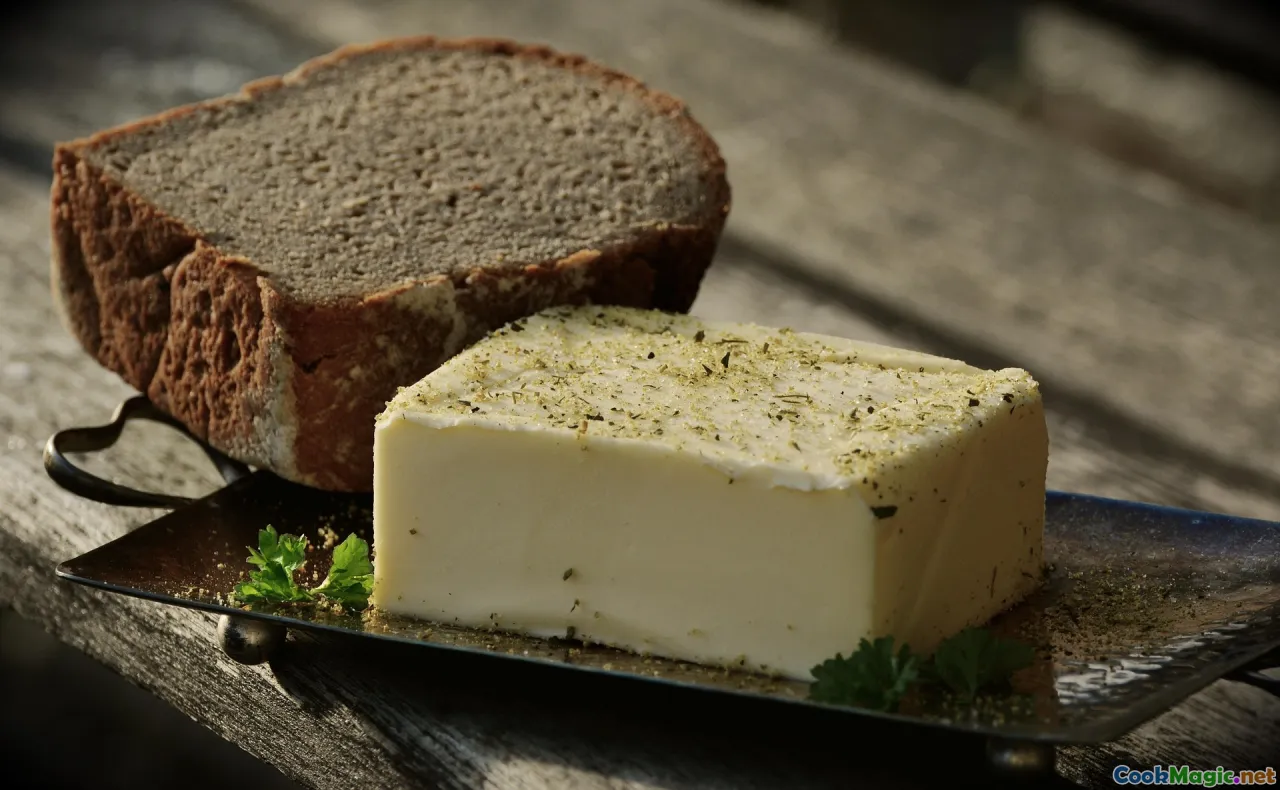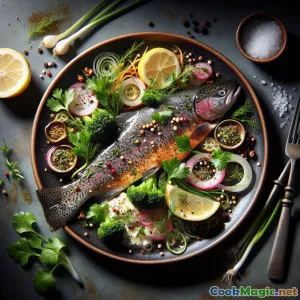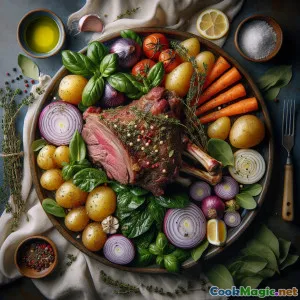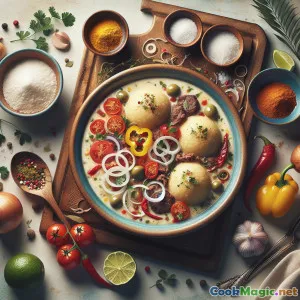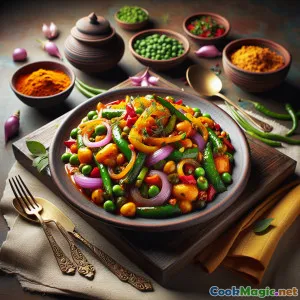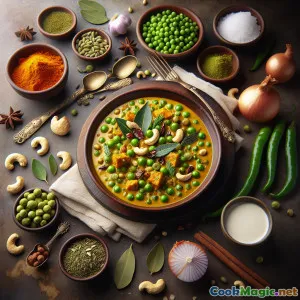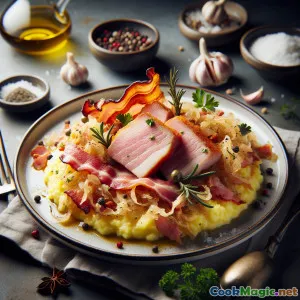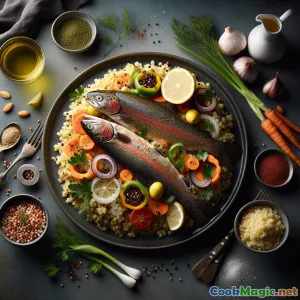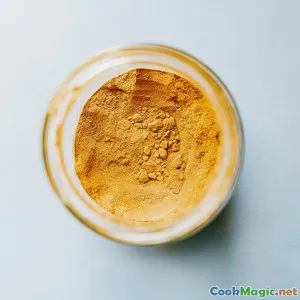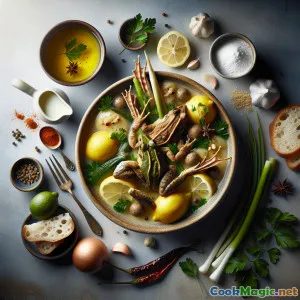
Żabie udka Neretwy z masłem z dzikich ziół
(Neretva Frog Legs with Wild Herb Butter)
(0 Recenzje)0
190
październik 06, 2025
Zgłoś problem
Składniki
-
800 grams Żabie nogi, bez skóry i oczyszczone
(About 16–20 legs; ethically sourced if possible)
-
250 ml Mleko
(Soak to mellow flavor and tenderize)
-
1 piece Cytryna
(zest and juice separated)
-
4 cloves Czosnek
(Drobno posiekane)
-
20 grams Pietruszka liściowa płaska
(Drobno posiekany)
-
10 grams Liście kopru włoskiego (fenku) lub świeży koper
(Chopped; evokes riverbank herbs)
-
1.5 tsp Sól morska
(Dostosuj do smaku)
-
1 tsp Świeżo zmielony czarny pieprz
(Dostosuj do smaku)
-
1 tsp Papryka wędzona
(Adds warm color and aroma)
-
60 grams Mąka uniwersalna
(For a light dredge)
-
40 grams drobna mąka kukurydziana
(Crispier crust with rustic texture)
-
60 grams Masło niesolone
(For basting and sauce)
-
30 ml Oliwa z oliwek extra virgin
(Prevents butter from scorching)
-
60 ml wytrawne białe wino
(Deglazes and brightens sauce)
-
0.5 tsp Płatki chili
(Gentle heat, optional)
-
2 pieces Szczypiorek
(Cienko pokrojone do dekoracji)
-
1 piece Liść laurowy
(Infuses the pan sauce subtly)
-
4 slices Chrupiący chleb wiejski
(For mopping up sauce)
-
400 grams Młode ziemniaki, blanszowane
(Optional riverbank-style side)
(About 16–20 legs; ethically sourced if possible)
(Soak to mellow flavor and tenderize)
(zest and juice separated)
(Drobno posiekane)
(Drobno posiekany)
(Chopped; evokes riverbank herbs)
(Dostosuj do smaku)
(Dostosuj do smaku)
(Adds warm color and aroma)
(For a light dredge)
(Crispier crust with rustic texture)
(For basting and sauce)
(Prevents butter from scorching)
(Deglazes and brightens sauce)
(Gentle heat, optional)
(Cienko pokrojone do dekoracji)
(Infuses the pan sauce subtly)
(For mopping up sauce)
(Optional riverbank-style side)
Wartości odżywcze
- Porcje: 4
- Wielkość porcji: 4 legs (220g)
- Calories: 420 kcal
- Carbohydrates: 0 g
- Protein: 38 g
- Fat: 22 g
- Fiber: 2 g
- Sugar: 2 g
- Sodium: 720 mg
- Cholesterol: 140 mg
- Calcium: 80 mg
- Iron: 3 mg
Instrukcje
-
1 - Soak the legs (optional but recommended):
Rinse frog legs under cold water. Submerge in milk with a pinch of salt for 20 minutes to soften flavor and tenderize. Drain and pat very dry with paper towels.
-
2 - Prep aromatics and dredge:
Zest the lemon and reserve; halve and juice it. Mince garlic and chop parsley and fennel/dill. In a shallow bowl, mix flour, cornmeal, smoked paprika, 1 tsp salt, and 1/2 tsp pepper.
-
3 - Season and coat:
Season the legs lightly with remaining salt and pepper. Dredge in the flour mixture, shaking off excess for a thin, even coat that helps crisping without heaviness.
-
4 - Sear to crisp:
Heat a cast-iron skillet over medium-high. Add olive oil, then half the butter. When foamy, lay in the legs without crowding. Sear 2–3 minutes per side until golden and just opaque.
-
5 - Build the pan sauce:
Lower heat to medium. Add garlic, chili flakes, and bay leaf; cook 30 seconds. Splash in white wine (if using) and simmer to reduce by half, scraping up browned bits.
-
6 - Butter-baste with herbs:
Add remaining butter, lemon zest, and half the parsley and fennel/dill. Tilt the pan and spoon the herby butter over the legs until glossy and aromatic.
-
7 - Finish with lemon and sides:
Squeeze in lemon juice to taste and remove bay leaf. Toss in parboiled new potatoes to glaze (optional). Sprinkle spring onions and remaining herbs.
-
8 - Rest and Serve:
Let rest 2 minutes for juices to settle. Serve immediately with crusty bread for the sauce, and extra lemon wedges on the side.
Rinse frog legs under cold water. Submerge in milk with a pinch of salt for 20 minutes to soften flavor and tenderize. Drain and pat very dry with paper towels.
Zest the lemon and reserve; halve and juice it. Mince garlic and chop parsley and fennel/dill. In a shallow bowl, mix flour, cornmeal, smoked paprika, 1 tsp salt, and 1/2 tsp pepper.
Season the legs lightly with remaining salt and pepper. Dredge in the flour mixture, shaking off excess for a thin, even coat that helps crisping without heaviness.
Heat a cast-iron skillet over medium-high. Add olive oil, then half the butter. When foamy, lay in the legs without crowding. Sear 2–3 minutes per side until golden and just opaque.
Lower heat to medium. Add garlic, chili flakes, and bay leaf; cook 30 seconds. Splash in white wine (if using) and simmer to reduce by half, scraping up browned bits.
Add remaining butter, lemon zest, and half the parsley and fennel/dill. Tilt the pan and spoon the herby butter over the legs until glossy and aromatic.
Squeeze in lemon juice to taste and remove bay leaf. Toss in parboiled new potatoes to glaze (optional). Sprinkle spring onions and remaining herbs.
Let rest 2 minutes for juices to settle. Serve immediately with crusty bread for the sauce, and extra lemon wedges on the side.
Więcej o: Żabie udka Neretwy z masłem z dzikich ziół
Overview Neretva Frog Legs à la Riverbank channels the rustic, riverside cooking traditions of the Neretva valley, which meanders from the Dinaric Alps through Herzegovina to the Adriatic. This dish leans on simple techniques—quick searing, butter basting, and a bright pan sauce—so the delicate sweetness of frog legs stays front and center. Crisp edges meet silky, lemony herb butter, and the skillet captures the same smoky, mineral notes you’d get from a hot stone or grill set beside the water.
Ingredients spotlight
- Frog legs: Mild, lean, and subtly sweet, they’re closer to a cross between chicken and white fish in texture. Pat them very dry; surface moisture is the enemy of crispness.
- Herbs: Parsley is classic; wild fennel fronds or dill evoke foraged riverbank aromatics. Keep a portion fresh for finishing to preserve color and fragrance.
- Lemon: Zest in the butter brings perfume; juice at the end sharpens flavors without turning the sauce bitter.
- Flour and cornmeal: A thin coat protects the flesh and encourages golden crust. Cornmeal adds a rustic crunch reminiscent of hearth-cooked river fare.
- Butter and olive oil: The oil raises the butter’s smoke point. Basting builds flavor fast while keeping the legs tender.
Technique notes
- Soak or not to soak: A brief milk soak softens any minerality and improves tenderness. Drain well and dry thoroughly—this step matters more than the soak itself.
- Heat management: Start with medium-high heat for color, then drop to medium to avoid scorching the butter and garlic. If the pan smokes aggressively, pull it off the heat for a moment.
- Searing cues: You’re aiming for browned, crisp surfaces and flesh that turns opaque and pulls from the bone with a gentle tug. Avoid overcooking, which can make the meat stringy.
- Sauce building: Deglazing lifts fond—those flavorful browned bits—into the sauce. If skipping wine, a splash of water or light stock still does the trick.
Serving suggestions
- Classic: Spoon the herb butter over the legs and serve with crusty country bread to catch every drop.
- Riverbank style: Toss parboiled new potatoes in the pan to glaze. A simple salad of tomatoes, onion, and sharp vinegar balances the richness.
- Picnic platter: Serve chilled or at room temperature with extra lemon wedges and a scattering of capers for brine.
Substitutions and variations
- Herbs: Swap parsley/fennel with tarragon or chervil for anise notes, or wild thyme for piney fragrance.
- Spice: Smoked paprika is optional; sweet paprika is gentler, while chili flakes add warmth.
- Grill variation: Marinate legs with oil, lemon zest, garlic, and herbs for 20 minutes. Grill over medium-high coals 2–3 minutes per side, then toss in melted herb butter.
- Gluten-free: Use rice flour in place of all-purpose flour and skip cornmeal if coarse; try fine polenta for a similar effect.
Make-ahead and storage
- Prep ahead: Dredge mixture can be blended a day in advance; keep herbs chopped but refrigerated and covered with a damp towel.
- Leftovers: Cool quickly, then refrigerate in an airtight container up to 2 days. Rewarm gently in a skillet with a touch of butter; avoid microwaving to preserve texture.
Cultural notes and history The Neretva valley has long celebrated freshwater bounty—eel, trout, and yes, frogs—prepared simply to showcase the river’s character. In Herzegovina’s countryside, cooks historically relied on what they could gather: wild fennel, bay, and parsley, lemons from the warmer delta, and robust bread baked in wood-fired ovens. Frogs were an early-spring delicacy after rains swelled the riverbanks, and the cooking approach favored minimal fuss: a hot surface, clean seasoning, and a final gloss of fat and herbs. The recipe here respects those roots while leaning into a modern skillet method you can reproduce anywhere.
Sourcing and sustainability Choose suppliers that emphasize responsible harvesting or regulated aquaculture. Ask for traceability and avoid peak breeding seasons where applicable. If frog legs are unavailable, this technique adapts well to small river fish fillets or rabbit loin—foods that share the lean, delicate profile.
Tips for success
- Dry thoroughly: Moisture prevents browning and promotes splatter. Pat the legs dry after soaking and again just before dredging.
- Thin dredge: Shake off excess flour to avoid a gummy coating.
- Butter timing: Add most of the butter toward the end, when the pan has cooled slightly after deglazing; you’ll get a glossy emulsion instead of separated fat.
- Finish fresh: Reserve half the herbs for the last minute to preserve their green vibrancy.
Troubleshooting
- Pale crust: Pan not hot enough or legs too wet. Preheat longer and dry more thoroughly.
- Bitter notes: Garlic scorched. Add it after searing and keep heat moderate when butter is in the pan.
- Soggy texture: Overcrowding steams the legs. Cook in batches and rewarm in butter at the end.
Pairings
- Wine: A zesty Herzegovinian Žilavka or any crisp, mineral white (Sauvignon Blanc, Albariño).
- Non-alcoholic: Sparkling water with lemon and a pinch of sea salt, or a tart apple must.
This dish captures the spirit of the riverbank: straightforward, aromatic, and convivial. With a few careful cues—drying well, managing heat, and finishing with fresh herbs—you’ll serve frog legs that are crisp, juicy, and unmistakably of the Neretva.

